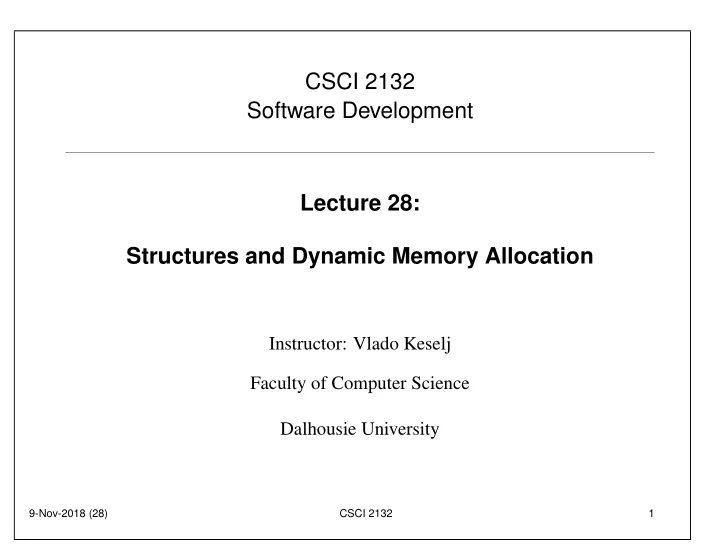

CSCI 2132 Software Development Lecture 28: Structures and Dynamic Memory Allocation Instructor: Vlado Keselj Faculty of Computer Science Dalhousie University 9-Nov-2018 (28) CSCI 2132 1
Previous Lecture • prj-dec2bin and stack example • Compilation of large programs • make utility (started) • make utility • Using gdb with multi-file programs • Structures (started) 9-Nov-2018 (28) CSCI 2132 2
Structure Example • Example structure declaration and two variables: struct student { int number; char name[26]; char username[11]; } x, y; • Declaring more variables struct student z, *p, first_year[200]; • Using dot ( . ) operator: z.number = 123456; strcpy(z.name, "John King"); 9-Nov-2018 (28) CSCI 2132 3
Example Code x.number = 123; strcpy(x.name, "Dennis Ritchie"); strcpy(x.username, "dritchie"); y = x; #define PRINT \ printf("number:%d\nname:%s\nusername:%s\n\n", \ x.number, x.name, x.username); \ printf("number:%d\nname:%s\nusername:%s\n\n", \ y.number, y.name, y.username); PRINT x.number = 456; strcpy(x.name, "Ken Thompson"); strcpy(x.username, "kthompson"); PRINT 9-Nov-2018 (28) CSCI 2132 4
Arrow Operator ( -> ) • Arrow operator p->f is a short-hand for (*p).f • Example: p = &z; (*p).number = 222333; • Second line equivalent to: p->number = 222333; • Structures can be used as function parameters • Not a good practice to pass large structures by value 9-Nov-2018 (28) CSCI 2132 5
Dynamic Memory Allocation • is allocation and release of memory on heap • Very flexible: we control time span and amount of memory • Using several library functions declared in stdlib.h • Function malloc prototype: void* malloc(size_t size); • Returns a generic pointer to allocated memory block • or NULL, if no memory available 9-Nov-2018 (28) CSCI 2132 6
Malloc Example • Example: int *p = (int*) malloc(10000*sizeof(int)); if (p == NULL ) { ... /* Error */ } 9-Nov-2018 (28) CSCI 2132 7
Function free • Used to free memory (deallocate, release) • Prototype: void free(void *ptr); • Can be used only on blocks allocated by malloc • After deallocation, the pointer becomes a dangling pointer • No garbage collection; beware of memory leaks 9-Nov-2018 (28) CSCI 2132 8
Recommend
More recommend